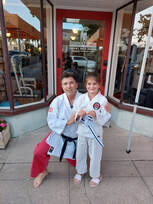
Five Kensington Karate teen students joined me in visiting a Jiu Jitsu/Grappling tournament at City College today. We watched six-year-olds and sixteen-year-olds alike, rolling on the mat like two snakes in a life and death struggle. Nearly three hours of matches later, it occurred to me that we did not see a single student over-celebrating a victory, nor a single student showing poor sportsmanship, no coaches yelling, no parents screaming, no arrogance or negative attitudes- I could go on. It reminded me why I chose to train in a traditional martial art for 35 years now, why I continue to teach, and why it is such a valuable activity for children.
I was particularly impressed with the parents who were watching, keeping a distance, letting the coaches and referees do their work, and being positive and supportive. I see the same thing at our annual Karate Heroes Tournament and Demonstration. Role-modeling respect for the officials, and guiding their youngsters to accept both victory and defeat with grace and sportsmanship. It is, at times, an effort to do so. How tempting is it to blame a poor score on the officials, or to insist that a competitor was "robbed"? Done in the name of not having the student's feelings hurt, it has a harmful long-term effect. Overcoming that temptation allows a child to come to grips with competition, losing, winning, and luck. It makes for a more resilient child, who is able to deal with failures, bounce back from defeats, and enjoy the moments of victory with some perspective.
Sometimes, a karate parent's role is to volunteer for an event, lead a committee, encourage students when they hit a bump, or just to ask to see their most recent karate move. Sometimes, a karate parent's role is to sit back and watch their child roll around on the mat. Sometimes, a parent's role is to not sign in for their child, not move their shoes under the benches, not tie their belt for them, and not remind them to bow in. And yes, the student is probably going to get yelled at. And yes... that's a good thing for them.
I was particularly impressed with the parents who were watching, keeping a distance, letting the coaches and referees do their work, and being positive and supportive. I see the same thing at our annual Karate Heroes Tournament and Demonstration. Role-modeling respect for the officials, and guiding their youngsters to accept both victory and defeat with grace and sportsmanship. It is, at times, an effort to do so. How tempting is it to blame a poor score on the officials, or to insist that a competitor was "robbed"? Done in the name of not having the student's feelings hurt, it has a harmful long-term effect. Overcoming that temptation allows a child to come to grips with competition, losing, winning, and luck. It makes for a more resilient child, who is able to deal with failures, bounce back from defeats, and enjoy the moments of victory with some perspective.
Sometimes, a karate parent's role is to volunteer for an event, lead a committee, encourage students when they hit a bump, or just to ask to see their most recent karate move. Sometimes, a karate parent's role is to sit back and watch their child roll around on the mat. Sometimes, a parent's role is to not sign in for their child, not move their shoes under the benches, not tie their belt for them, and not remind them to bow in. And yes, the student is probably going to get yelled at. And yes... that's a good thing for them.
 RSS Feed
RSS Feed
